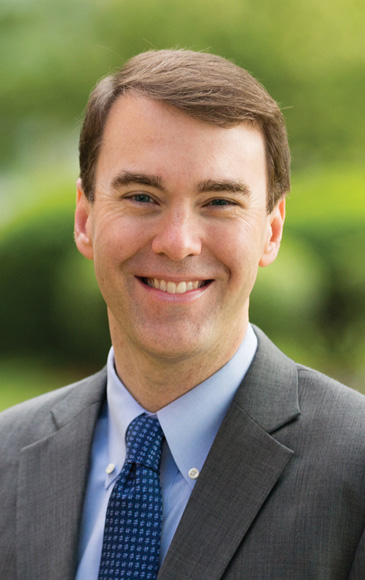A Conversation on Life's Transitions with D. Michael Lindsay
In this interview, Michael Lindsay explores the seven stages of transition he writes about in his book Hinge Moments. With vulnerability and insight, he shares how he has navigated his own vocational transition from president of Gordon College to president-elect of Taylor University.
Leaving Gordon College this year and becoming the appointed president for Taylor University, you are experiencing your own hinge moment. What insights from your book have you seen in new ways as you prepare to make the most of this current life transition?
Michael Lindsay: In the book, I outline seven stages of transition, which are graphed against two axes: time and one's sense of confidence. The low point for everyone in transition occurs in what I call the intersection stage, the point when we are between our former life and the new life we will experience as a result of this hinge moment. For some changes, the intersection stage lasts only minutes; for others, it can last months. For me in this most recent hinge moment, it lasted about four months as I waited to see where the Lord would take us after announcing my decision to leave Gordon.
Love, encouragement, and support from family members and special friends are very important in the intersection stage because many of our other networks and sources of support are removed in this liminal phase. This is true even in changes we bring on ourselves: I relied on loved ones more than I have in years after deciding to step down at Gordon. But I'm also living proof that the intersection stage eventually passes, and we move into phases of greater confidence and encouraging hope. That's the great thing about God's redemptive work in the midst of hinge moments; he keeps moving us along, and in so doing, we make peace with the change and become stronger for the journey ahead.
That's the great thing about God's redemptive work in the midst of hinge moments; he keeps moving us along, and in so doing, we make peace with the change and become stronger for the journey ahead.
In the book Hinge Moments, you outline seven different phases that occur during a transition. To date, you have experienced discernment, anticipation, and intersection as you move from Gordon to Taylor. Are there any new lessons from these phases that you learned from this recent transition that aren't referenced in the book that you could share?
Lindsay: I am more convinced than ever that God can use our bodies to give us helpful indications of what's happening in our spirit even when we, in our conscious thinking, are not fully aware. In the discernment and anticipation phases, pay attention to things like the butterflies in your stomach—when they come, what calms them down, and how long they last. They can be signals that change is approaching, whether by our own choosing or someone else's, and indications that a godly restlessness may be growing within us by the prompting of the Lord. God can also use conversations with others, sermons, or devotional readings, as well as new observations and nighttime dreams as signposts that change may be afoot. The great thing about the Christian life is that God is working to redeem all things, and he often guides us in the hinge moments of our life through a variety of signals and signposts.
What part of the upcoming phases of landing, integration, inspiration, and realization are you most looking forward to as it relates to this transition?
Lindsay: For all of us, the best part of any change in our life is the chance to start anew, to develop new friendships and connections, and to grow more fully into the mature person God wants us to become. So as I prepare for my start as Taylor's next president, I am most looking forward to the chance to get to know the wonderful people associated with the university and to have a chance to be a better, wiser, and more effective college president in what will be my second lap around the college presidential track.
Also, I am a big believer that every person and every institution needs to experience some form of self-renewal every so often. As such, this hinge moment in my life is also providing a chance to renew my sense of calling to Christian higher education and giving both Gordon and Taylor a chance to start a new chapter. It's exciting and energizing for everyone.
Of the seven phases, is there one that you feel is the most critical? Why is that phase so critical, especially in relation to vocation, in your view?
Lindsay: I think our character is shaped most profoundly in the intersection phase of a transition because it represents a time when we have the fewest forms of support. So we rely on God more fully and regularly than we do in the other phases. As such, the Lord can use that particular season as a chance to redirect us to new opportunities, new professional horizons, even new ways of thinking about ourselves and the contribution we make. That said, we can only remain in this phase for a limited time period because it's emotionally and spiritually draining, so we rely on our reserves a good bit in this phase.
I think our character is shaped most profoundly in the intersection phase of a transition because it represents a time when we have the fewest forms of support.
Eventually, in God's providence we move forward to the landing, integration, and later phases of transition. As this occurs, we are confirmed in our new callings and get excited about the positive aspects of the change. Things like loss, disappointment, and isolation diminish as we become more fully integrated and are able to more fully embrace our new season. This is true for a job change, a relocation, or even a family change like having a baby or rebuilding our lives after a loved one dies. The trajectory of our recovery from the change is determined, at least in part, in how we handle the intersection phase of transition, which is why it matters so much that we handle that season with godly wisdom and faithful commitment.
How are you working to make the most of this life transition for yourself, your family, and your new colleagues?
Lindsay: Saying goodbye well is really hard. For starters, once we know where we are headed next, our heart and mind become increasingly focused on the next chapter, so our ties to our last chapter become looser. And then there is all the sadness about not seeing beloved colleagues and friends regularly and the fear of the unknowns about what will be challenges in the next chapter. But the way you say goodbye says as much about your character as does the way you carry yourself in your new place. So my wife and I are thinking a good bit about finishing well at Gordon even as we are excited about the promise and possibilities that await us at Taylor.
One practical way to manage this transition well relates to giving yourself some time between the two roles. We are taking several weeks between the time at Gordon and Taylor to decompress a bit with some time off, but we are also making sure to have time to pack up, move, and unpack. Feeling settled at home is important to success at work, and we wanted to have the space and time to do that well while also giving it our all through the end of our time at Gordon. So we are excited about what's coming ahead and working diligently to manage this hinge moment as best we can.









